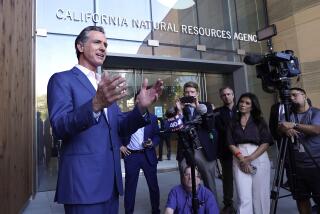Bush Team to Oppose Democrats’ Fuel Standard Plan
The Bush administration today will announce that it opposes a Democratic proposal to require dramatic improvements in fuel efficiency for cars and trucks sold in the U.S., a move sharpening the partisan divide over energy policy.
While the Democratic plan would mandate specific fuel economy increases over the next decade, the White House will urge that Congress instead authorize the Department of Transportation to set the standards later on, according to a senior White House official.
Environmentalists and many Democrats fear such a process would provide too much leverage to the auto industry and undercut efforts to impose tougher standards. But the idea could have considerable appeal to Democrats from automobile-manufacturing states, who are facing intense resistance to the mandated increase from auto companies and the United Auto Workers.
The pending White House announcement means that Bush and Democratic leaders have each targeted the other’s top priority in the energy bill the Senate is expected to start debating in the next few days.
Democrats strongly oppose Bush’s push to open a portion of the Arctic National Wildlife Refuge to oil drilling. And the White House is privately acknowledging that it does not now have the votes to break a threatened Democratic filibuster against the drilling proposal, contained in a bill the House passed last year.
“This is probably as fluid a vote count as they get,” said the administration official. “But we feel at this point there are 53 to 55 votes for” Arctic drilling.
That’s well short of the 60 Senate votes it would take to break a filibuster against the drilling, as promised by Sen. John F. Kerry (D-Mass.).
Kerry, along with Sen. Ernest F. Hollings (D-S.C.), is also the principal author of the fuel economy standards called for in the Democratic bill. That proposal would require cars and SUVs sold in the U.S. to reach an average performance of 35 miles per gallon by 2013--the most dramatic change in the program since the fuel economy standards were first signed into law by President Ford.
Passenger cars currently must meet a “corporate average fuel economy,” or CAFE, standard of 27.5 mpg. Light trucks, including SUVs, are permitted to meet an average of 20.7 mpg. Car makers are allowed to average the standard across their fleets, so smaller cars can offset the guzzlers.
Because SUVs and pickups make up an increasing share of new vehicles sold, the overall fuel economy performance for 2001 model year vehicles has dropped to about 20.4 miles per gallon, the lowest level since 1980, according to government studies.
Environmentalists say tougher fuel-economy standards will do more to reduce U.S. dependence on foreign oil than Bush’s priority of opening up a portion of the Arctic refuge to drilling; sponsors project that the new standards would eventually save as much as 1.6 million barrels of oil a day, as much as the U.S. now imports from Saudi Arabia.
Environmentalists also say tougher fuel standards will reduce emissions of carbon dioxide, a gas linked to global warming.
But the auto industry and the auto workers union have argued that requiring rapid increases in fuel economy could cost jobs and endanger passenger safety by requiring the manufacturers to produce lighter cars.
In the statement to be released today, the administration will argue that while some increase in the standards is justified, it would be inappropriate for Congress to write specific levels into law.
“There probably can be an increase, and we support an increase,” said the White House official. “But we do have real concerns about any arbitrary increase that doesn’t recognize safety concerns. The question on CAFE is to how much flexibility they are going to allow for the [Transportation] Department to do a deliberative process . . . based on the best data and science.”
But supporters of the higher standards believe that leaving the issue to the department would give the auto industry an inside track on preventing significant change.
“This is another move in a regrettable shell game to conceal the fact that the administration and the auto industry are joined at the hip, refusing to embrace fuel efficiency as a way to help break our dependence on foreign oil,” Kerry said.
Sen. Dianne Feinstein (D-Calif.), a leading advocate of tougher standards, said, “For years nothing has been done to improve fuel efficiency and if we leave it in the hands of an agency, I don’t believe anything additional will be done.”
But the administration proposal could prove attractive to wavering Democrats from states with a large auto manufacturing presence. Sen. Carl Levin (D-Mich.) has reportedly been crafting a similar provision as an alternative to the Kerry-Hollings plan.
The auto industry has argued for leaving the decision on fuel standards with the Transportation Department’s National Highway Traffic Safety Administration, and it reacted favorably to Bush’s position.
“We’re reconciled to [safety administration officials] setting” the level, said Gloria Bergquist, spokeswoman for the Alliance of Automobile Manufacturers. “We may not like the number that they come out with, but at least they’re going to gather data to base a number on, as opposed to plucking a number out of the air.”
The earliest that the federal agency could put tougher fuel-economy standards in effect would be for model year 2005 because of the time required to study the issue, including taking public comment.
On Wednesday, Kerry acknowledged that his proposed increase faces “an uphill battle.”
“Do we have the votes today to pass this? The answer is probably not,” he said.
Last summer, House Democrats from auto-producing states joined a majority of Republicans to decisively kill an amendment requiring sport-utility vehicles, minivans and pickups to achieve a 27.5 mpg average by 2007.
The House-approved energy bill instead calls for a 5-billion-gallon reduction in gasoline use by SUVs, minivans and pickups over the next six years. Critics say that standard would raise gas mileage by only about 1 mpg.
Both the administration and Democratic leaders have indicated that they would oppose one potential way to break the legislative impasse: a compromise that allowed some expanded drilling within the Arctic refuge for some increase in fuel economy standards.
More to Read
Sign up for Essential California
The most important California stories and recommendations in your inbox every morning.
You may occasionally receive promotional content from the Los Angeles Times.











